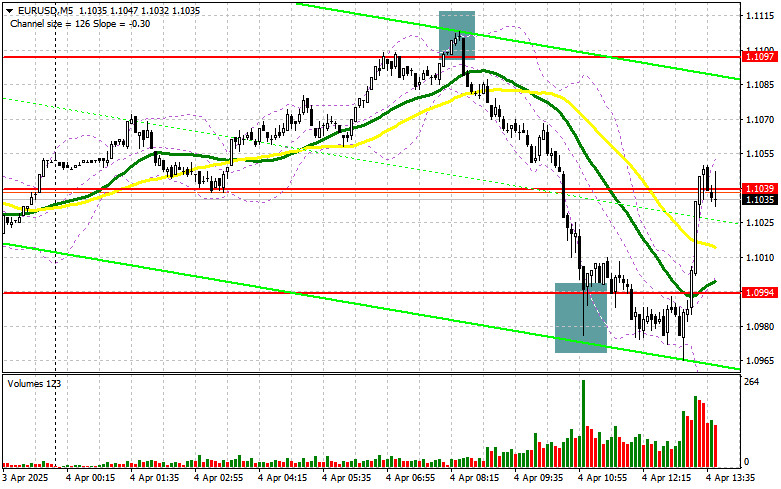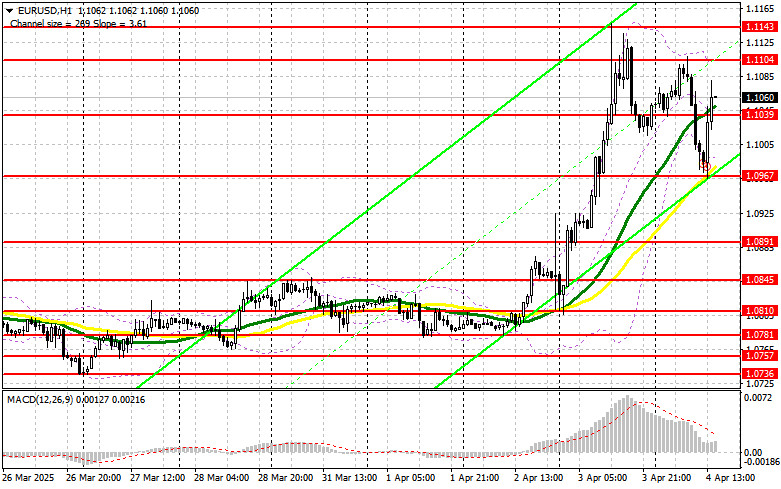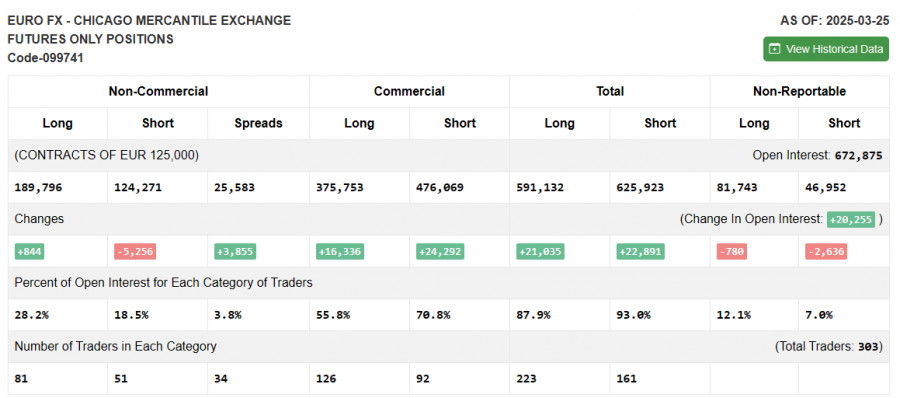See also


 04.04.2025 07:52 PM
04.04.2025 07:52 PMIn my morning forecast, I highlighted the 1.0994 level and planned to base my market entry decisions on it. Let's look at the 5-minute chart and break down what happened there. A decline followed by a false breakout at that level provided an excellent entry point for long positions, resulting in a 50-point rally in the euro. The technical outlook was revised for the second half of the day.
To Open Long Positions on EUR/USD:
The euro posted a decent correction against the U.S. dollar, which large players quickly took advantage of by increasing their long positions ahead of key U.S. economic data. Two important reports lie ahead: nonfarm payrolls for March and the unemployment rate. These will determine the pair's direction.
Later in the U.S. session, Fed Chair Jerome Powell will speak and is expected to comment on the recently imposed U.S. tariffs on key trading partners, which could spark volatility in the U.S. dollar.
If the euro declines after the data release, a false breakout around the 1.1039 support will be a signal to buy EUR/USD, aiming for a bullish continuation toward 1.1104. A breakout and retest of that range from above would confirm the correct entry point for long positions, with targets at 1.1143, and the final target at 1.1179, where I will take profits.
In the scenario where EUR/USD falls and there is no buying activity near 1.1039, pressure on the euro will intensify. In this case, sellers may push the pair down to 1.0967. Only after a false breakout forms there will I consider buying. I also plan to open long positions on a rebound from 1.0891, targeting a 30–35 point intraday correction.
To Open Short Positions on EUR/USD:
Sellers tried in the first half of the day, and with some success, but failed to hold their ground. Now the outlook depends on strong U.S. data. If the reaction to the reports is negative, a false breakout at the 1.1104 resistance will offer a short entry point, targeting support at 1.1039. A breakout and consolidation below this level would be a good selling opportunity with further movement toward 1.0967, and the final target at 1.0891, where I will take profits.
If EUR/USD continues rising in the second half of the day—which seems more likely—and bears fail to act around 1.1104, I will postpone shorts until we test the next resistance at 1.1143, where I'll only sell after a failed consolidation. If there's no downward move even there, I'll consider shorts on a rebound from 1.1179, aiming for a 30–35 point pullback.
COT Report (Commitment of Traders) – March 25:
The COT report showed a slight increase in long positions and a rather sharp reduction in shorts. Interest in buying the euro is not rising significantly, but sellers continue to exit the market. Given the latest eurozone inflation data and ECB officials' comments, the central bank is likely to maintain its current stance at the April meeting, which could support the euro in the short term.
However, the extent to which U.S. tariffs impact other countries will be critical. The greater the perceived threat to global growth, the more pressure there will be on risk assets—including the euro. Long non-commercial positions rose by 844 to 189,796 and short non-commercial positions fell by 5,256 to 124,271. The gap between longs and shorts widened by 3,855
Indicator Signals:
Moving Averages Trading is taking place above the 30- and 50-period moving averages, indicating a new bullish market for the euro.Note: The author uses H1 (hourly) charts to determine moving averages, which may differ from D1 (daily) chart readings.
Bollinger Bands In case of a decline, the lower band around 1.1000 will serve as support.
Indicator Descriptions:
You have already liked this post today
*The market analysis posted here is meant to increase your awareness, but not to give instructions to make a trade.
Analysis of Thursday's Trades 1H Chart of GBP/USD The GBP/USD pair continued to trade higher throughout Thursday. Even at its peak levels, the British pound shows no intention of correcting
Analysis of Thursday's Trades 1H Chart of EUR/USD The EUR/USD currency pair continued trading within a sideways channel on Thursday, as shown on the hourly timeframe chart above. The current
The GBP/USD currency pair continued its upward movement on Thursday, trading near multi-year highs. Despite the lack of significant events in the U.S. or the U.K. (unlike Wednesday), the market
The EUR/USD currency pair continued to trade sideways on Thursday. While previously it had been moving within a range between 1.1274 and 1.1391, on Thursday, it was stuck
In my morning forecast, I highlighted the 1.3247 level as a reference point for market entry decisions. Let's take a look at the 5-minute chart and analyze what happened
In my morning forecast, I highlighted the 1.1341 level as a key point for market entry decisions. Let's take a look at the 5-minute chart and analyze what happened there
Analysis of Tuesday's Trades 1H Chart of GBP/USD Throughout Tuesday, the GBP/USD pair continued its upward movement. As we can see, the British currency doesn't need any particular reason
Analysis of Tuesday's Trades 1H Chart of EUR/USD On Tuesday, the EUR/USD currency pair pulled back slightly, which can be considered a purely technical correction. Yesterday — and generally —
InstaTrade
PAMM accounts

Your IP address shows that you are currently located in the USA. If you are a resident of the United States, you are prohibited from using the services of InstaFintech Group including online trading, online transfers, deposit/withdrawal of funds, etc.
If you think you are seeing this message by mistake and your location is not the US, kindly proceed to the website. Otherwise, you must leave the website in order to comply with government restrictions.
Why does your IP address show your location as the USA?
Please confirm whether you are a US resident or not by clicking the relevant button below. If you choose the wrong option, being a US resident, you will not be able to open an account with InstaTrade anyway.
We are sorry for any inconvenience caused by this message.



